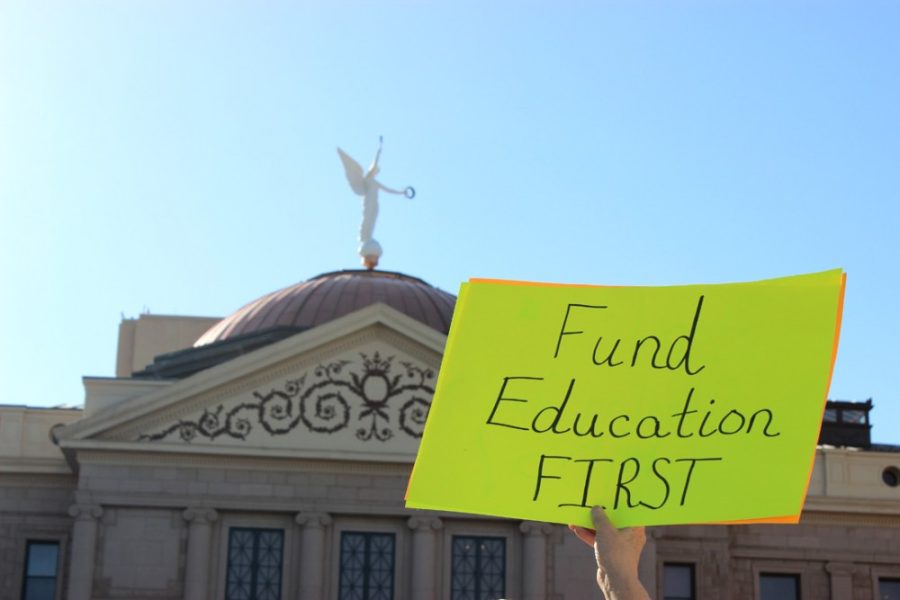PHOENIX — Following closed-door negotiations, Gov. Doug Ducey and Republican House and Senate leaders unveiled a budget deal this week and moved swiftly to push the budget bills through the legislative process.
Late Thursday, it appeared the GOP leadership didn’t have the votes to pass the budget deal, but negotiations continued.
The new $9.1 billion budget proposal drew strong criticism from Democrats and hundreds of protesters to the Capitol on Thursday, including Arizona State University students who marched from the ASU Downtown Phoenix campus against proposed university cuts.
Budget deal highlights
Lawmakers were briefed Tuesday evening about the budget deal and details began emerging on Wednesday.
Here are some highlights from the deal:
— The new proposal raises cuts to higher education to $104 million, representing about 14 percent of state support. The cuts fall to each university based on enrollment: $56 million to ASU, $30 million to UA and $18 million to Northern Arizona University.
— All state funding is stripped for community colleges in Maricopa, Pima and Pinal counties, Arizona’s three largest community college districts.
— K-12 schools in the state will see a net increase in funding by about $78 million. The budget still recognizes the Legislature’s settlement offer of $74 million in the K-12 funding lawsuit, rather than the court-order $336 million.
— The Department of Corrections also sees an increase in funding by about $34 million, which is less than Ducey’s proposal of a $52 million increase. The new proposal also reduces Ducey’s call for 3,000 new beds for prisoners to 1,000.
— Medicaid also faces cuts with a 5-percent cut proposed to state reimbursement payments, which would likely shift the costs onto hospitals.
The House Appropriations Committee and the Senate Appropriations Committee met Thursday afternoon to hear the budget bills. Protesters interrupted the Senate Appropriations meeting briefly, chanting “They say cut back, we say fight back.”
Friday would be the earliest the budget could pass as the Arizona Constitution requires at least three days for the budget bills to be heard.
If at first you don’t succeed…
Would you like to carry a gun into your local library? The House passed House Bill 2330, which allows people with valid permits to carry concealed weapons into public buildings and events. Gov. Jan Brewer vetoed three incarnations of the legislation during her tenure.
Rep. Randall Friese, D-Tucson, and other Democrats criticized the legislation on the floor.
“With the history of this legislation, with it having been vetoed three times before, I think we should move on to more important measures,” Friese said.
He is a trauma surgeon who treated victims of the 2011 Tucson shooting.
Rep. Brenda Barton, R-Payson, the bill’s sponsor, defended the legislation, calling it a “God-given right” for Arizonans. “This is something that we have inherently,” she said.
Rep. Mark Cardenas, D-Phoenix, voiced concerns related to the costs of the bill. An entity would be able to keep their buildings weapon-free if it provides security personnel and a screening device at entrances. The Arizona Department of Administration estimated it would cost the agency between $10 million and $16.9 million for the first year and $9.4 million to $15.7 million in subsequent years.
Redistricting case at the Supreme Court
Top legislative leaders took Monday off to travel to Washington as the Supreme Court heard arguments in a legal dispute over who controls congressional redistricting in the state.
The case, Arizona State Legislature v. Arizona Independent Redistricting Commission, centers on whether the Legislature or a voter-approved commission has the ability to control redistricting within the state. The Arizona Legislature asserts it solely has the authority in the Constitution to redraw the congressional map in the state.
In 2000, Arizona voters passed an initiative to give that redistricting power to an independent commission. Eleven other states have independent redistricting commissions.
Speaker of the House David Gowan, R-Sierra Vista, and Senate President Andy Biggs, R-Gilbert, made the 4,000 round mile trip and returned to Phoenix in time for the budget drama to begin.









